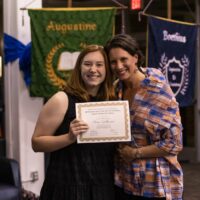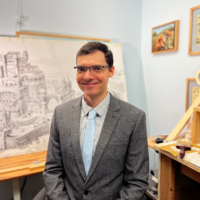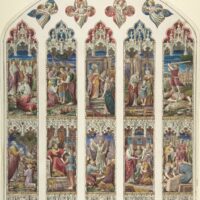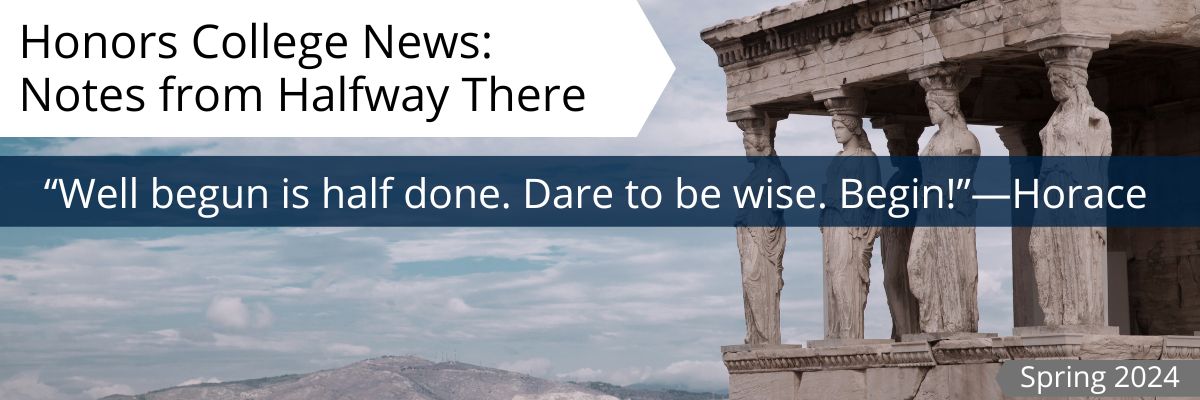
Dear Friends of the Honors College,
One goal of a good education should be to help students become friends. As I read the interviews with Claire Wilkerson, Joel Stanulonis, and Tamara Matthew in this edition of the newsletter, I was struck by the centrality of friendship in each of their stories. I’m grateful that in the Honors College we are able to keep this goal central to our educational endeavors. For what does it profit an honors program if it places all its graduates in prestigious jobs and schools but makes them friendless loners?
This spring, the Honors College lecture series has presented current Honors Scholars with a feast of lectures on friendship. Drawing from the wisdom of the Bible, of Aristotle, Faulkner, Lewis, and even noted philosopher Ted Lasso, we have listened to faculty speak about what friendship is and how it enriches our lives. I trust that as a friend of the Honors College, you have friends that enrich your life. Perhaps, hopefully, you are friends even with that friend Plato described as “the first friend,” the one friend for the sake of which all other friends are friends.
In the past few years, the American Council of Trustees and Alumni (ACTA) has become one of the institutional friends of the Honors College. ACTA is committed to promoting robust liberal-arts education at the university level, and we are grateful that they have recently designated the Honors College as an ACTA Hidden Gem, which indicates that the Honors College is committed to guiding students through a high-quality and coherent interdisciplinary education across the liberal arts. You can read more about the Hidden Gems program at HCU’s website.
Lastly, at the Honors College Commissioning Service this spring, the faculty will be awarding our first Honors College Alumni award to recognize an outstanding Honors College alumni. If you know of an Honors College alumni that you would like to nominate for this award, please get in touch with the Honors College office.
Sincerely,
Gary Hartenburg
Director, The Honors College
Houston Christian University
Featured in this issue of News & Notes:
Current Student: Claire Wilkerson
Claire Wilkerson is a second-year Honors Scholar majoring in Theological Studies. Hailing from the Dallas-Ft. Worth area, she found HCU to be a welcome place to continue her journey of learning more about herself, God, and others. The Honors College, she says, has been a welcome space to ask hard questions and a formative aspect of her undergraduate experience. At the end of her freshman year, Claire was awarded the Most Outstanding First-Year Student award for her commitment to seeking the truth in love alongside her peers.
Welcome to HCU! How did you hear about us? And more specifically, the Honors College?
I got an email [from HCU] when I first started applying to Christian colleges. I didn’t think I was going to come here, but my mom showed me a video of Dr. Hartenburg talking about the Honors College and encouraged me to apply. I remember I came in for my interview with Dr. Hartenburg in February, and we were sitting outside as Dr. Paul Sloan was walking by with his little baby. There wasn’t anyone on campus, but I remember having a nice conversation with them both and thinking it felt right to be there. I went to the Academic Scholars Reception with my parents and heard Dr. Hartenburg speak. The attitude everyone at HCU has surrounding education just made me feel really good about the decision to come here.
When I was in high school, I had a very different idea about what college would be like. I was actually really nervous about the Honors College because I had been at the top of my class in high school, but the courses weren’t very challenging. So that made me nervous. I kind of felt like a fraud getting into the Honors College. But I loved to read, and so that summer before freshman year as I was reading the Iliad, I was so nervous about what was going to happen. I had never read anything like that before. The Honors College is what got me here, really. I’m glad I made the decision to attend HCU.
What would you say has been your favorite text so far?
I really enjoyed Antigone and most of the Greek tragedies. It’s kind of like Shakespeare in that the more you read, the more you get accustomed to the language, the more it makes sense. I remember that discussion being a lot of fun. We had Dr. Leachman in an 8:15 a.m. section and usually people are almost half-asleep, but that morning everyone was wide awake and eager to discuss.
But I think my favorite text so far has been Plato’s Apology, which we discussed during orientation and later revisited. I think it’s my favorite because I finally started to understand what Plato was talking about with his idea of the forms. Plato means that you can see beauty, but he wants to see the complete form of beauty, beauty itself. It reminds me a lot of the attributes of God, like righteousness. Righteousness can be displayed, but God himself is righteousness. I found Socrates’s genuine expression of emotion very moving and beautiful. I felt as though I was starting to understand—not understand completely by any means—but I was starting to really love what I was doing, what I was reading and discussing with other people. I read a lot in high school outside of class, a lot of modern fiction, but I’ve found it to be so special what we’re doing. When you sit down at a table and agree to think about something together, to think through ancient and classic literature together, you learn a lot more.
How would you say you’ve grown personally?
I think that generally I tend to be very overconfident. What I’m saying in class isn’t necessarily wrong, but I definitely had to learn that what other people think about the text or have observed about the text could quite possibly be more insightful than whatever I have to say about it. I had to learn to trust the people around me, that they would have something good and true to point out about the text. Taking that outside of the text that you’re discussing, it has a lot to say about how you interact with others outside of the classroom.
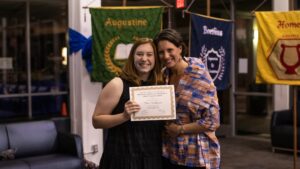
My mentor is Dr. Stelzer, and I was recently sharing with her that I felt so different this semester than before I came to HCU and started the Honors College. In our mentor meeting, Dr. Stelzer had said that I was doing really well in class, but very sweetly asked me if I had considered talking less. I was angry with her at first, but looking back, that was the most formative thing that happened to me all semester. Because afterwards I talked with other faculty members and they were very willing to talk with me about what class looks like and trying to help me do better. I realized that I had somewhat dominated the classroom in a way that wasn’t helpful for others, and in a way that actually discouraged them from participating in discussion.
Learning how to interject and to make space for others is a hard balance to find, but a lesson that impacts other areas of your life. What does it mean to carefully consider someone else’s point of view? And how do you deal with the fact that, maybe, you’re wrong? This also came into play in my major classes because theologically, I had these things I was holding onto very tightly and that I thought were very important and I had to struggle with the fact that maybe I was wrong, and if I was wrong, then what was right? I had to overcome myself in order to wrestle with change. I thought when I came to college I had it all figured out, but I’ve been humbled to find that I didn’t, but in a very encouraging way.
What are your goals? What are you working towards?
When I was in high school I was involved in a girl’s ministry which was focused on sharing the gospel with other girls in public schools. The organization provided a lot of training. I came to realize that it was the field of apologetics that I was so captivated by. Not only did I enjoy it, but I was good at it, so I wanted to continue in what I had started. When people ask me what I’m going to do with my theology degree, I’m not always able to give a clear answer. I know I don’t want to go to seminary. I want to write books, I think. I’m very interested in the intersection of Christianity and culture, especially in the realm of literature. The more that I’m here, I’m considering maybe doing graduate work, which I think would be fun and rewarding, but it’s still really early on, so I’m going to sit on that one for a bit.
So you live on campus, do you room with other Honors College students? And how is that going?
It’s nice, and fun! But, I’ve realized that I’m kind of an old lady. It’ll be like 10:00 p.m., and I’m ready to go to bed, and I peek my head out into the living room and my roommates are all still reading the book for class the next day like, “We’ll be up until 2:00!” and I’m like, “Okay, goodnight!” It’s been good living with them, though. We’re not all best friends, but we all get along and we all love and appreciate each other. It’s nice to have everybody understand what you’re working on and what you’re doing, because they’re all doing the same thing. When I’m not in class, I’m at work. When I’m not at work, I’m reading. And when I’m not reading, I’m asleep. I can’t function without sleep.
Getting There: The Pedagogy of Purgatory
Written by Ms. Katrina Bolman, MLitt
In Book 27 of Dante’s Purgatorio, Dante ends his journey through the “temporal and eternal fires” (XXVII.127-8) and enters into the Garden of Earthly Paradise: the final stop in Purgatory before entering the heavenly spheres of Paradiso. However, as his guide, the Roman poet Vergil enters the Garden with him, he offers this speech to Dante as part of his final farewell:
Here, now, is the limit of my discernment.
I have led you here by grace of mind and art;
Now let your own good pleasure be your guide;
You are past the steep ways, past the narrow part.
…
Expect no more of me in word or deed:
Here your will is upright, free, and whole,
And you would be in error not to heedWhatever your own impulse prompts you to:
Lord of yourself I crown and mitre you.(Purgatorio, XXVII.129-143, trans. Ciardi)
Dante isn’t left on his own for long, as the Lady Beatrice soon appears to show him through the spheres of heaven (XXX.55-58). However, this cryptic statement by Vergil — “Lord of yourself I crown and mitre you” — marks an important transition in the Divine Comedy.
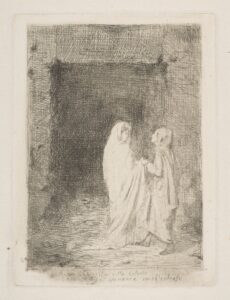 One of the main plot points of the Commedia is the transformation of Dante’s appetites to better serve him on the final steps of his journey. This education of the soul that Dante experiences follows one of the central tenants of a liberal arts education: self-discipline and self-discernment. But how does Dante become a “lord of [him]self”?
One of the main plot points of the Commedia is the transformation of Dante’s appetites to better serve him on the final steps of his journey. This education of the soul that Dante experiences follows one of the central tenants of a liberal arts education: self-discipline and self-discernment. But how does Dante become a “lord of [him]self”?
Each cornice of Purgatory is nestled (quite literally) between an example of the virtue one is trying to achieve— the Whip— and the example of the vice one is trying to escape — the Rein. In Purgatory, these two opposing examples of virtue and of vice provide souls with both an encouragement to virtue, and a warning against vice. These examples, pulled from both secular and scriptural history, serve as models for Dante’s education. Vergil, as the instructor, serves as a guide to the interpretation of these examples to guide Dante to his final goal.
This use of history and literature to train the soul in virtuous living is something that is not unique to Dante: it is the foundation not only of education in the later years of the Roman empire, but of the medieval liberal arts tradition that was rising to prominence over the course of the Renaissance. This tradition is the foundation of the liberal arts tradition as we inherited it from Europe.
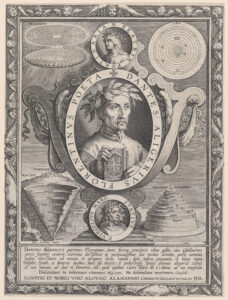 However, achieving self-discipline and self-discernment via the study of examples is only the beginning of moral education for Dante. Even with the highest achievements of human reason, as personified in Vergil, divine grace is still needed to prepare the soul to encounter God in His full glory. While Vergil is able to sustain Dante’s education in discerning virtue and vice in the earthly realms, the leap from earth to Paradise is not accomplished through education, but through divine intervention.
However, achieving self-discipline and self-discernment via the study of examples is only the beginning of moral education for Dante. Even with the highest achievements of human reason, as personified in Vergil, divine grace is still needed to prepare the soul to encounter God in His full glory. While Vergil is able to sustain Dante’s education in discerning virtue and vice in the earthly realms, the leap from earth to Paradise is not accomplished through education, but through divine intervention.
But we are not alone in this step, and neither is Dante. As Vergil vanishes, Dante is able to make the transition into eternity with the help of Beatrice and others who have made the leap before. There is hope for us too, that we’ll get there. We just need to start.
Faculty Feature: Mr. Joel Stanulonis, MFA
 What was your experience like as a student in the Honors College?
What was your experience like as a student in the Honors College?
I started my undergraduate program in 2008, so I was one of the first Honors College students to graduate from HCU. It was a great experience. I learned a lot.
Have you always done art since you were a child?
Yes, I was doing art before I learned to write. While my parents had an inkling that I would pursue it for a career. I wasn’t so sure at first. However, I just became so engrossed in it that I didn’t bother to think of doing anything else.
How has your art style developed?
My art style always seems to change every year, and that’s part of the excitement of it. You never know where you’re going to be two or three years from now. I knew I always wanted to do something technical because I like the analytical side of art.
Where did you go for graduate school?
I went to Pennsylvania Academy of Fine Arts (PAFH). It is known for representational disciplines. Several well-known American artists came from there in the 1800s that focused on drawing from life.
Can you tell me about your art piece hanging in the UAC lobby?
That’s actually a print of it. The original was purchased by the museum at my grad school in Philadelphia. I created the drawing for my thesis show. It was definitely a breakthrough piece for me as it started a series of other large drawings.
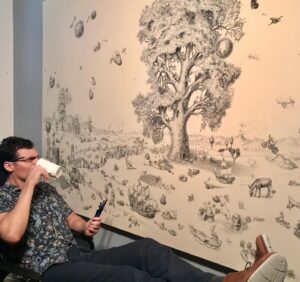
Were you interested in teaching after grad school?
I was interested in teaching but planned to do something else for a few years before I started. But then I got a call to teach at HCU, and I’ve been here since 2014.
What do you love most about teaching art?
I love the students’ enthusiasm. Most of the students want to be there and have a love of art and making things. Just seeing their faces light up as they explore new mediums and what that unlocks for their artwork is so great. I also love to see the work of the grad students because it inspires me and my own work. I don’t see myself as just a teacher, but rather as a peer and fellow artist because I’m walking alongside them.
Do you have encouragement for students who enjoy art but don’t believe it’s up to par to pursue it professionally?
The twenty-first century really doesn’t have a definition for what “the par” is. “Art” itself has become such a broad term and there are many different styles, and each style has a unique market and clientele. It’s more of just a matter of finding your niche. The most important thing is just making sure that you really enjoy doing art.
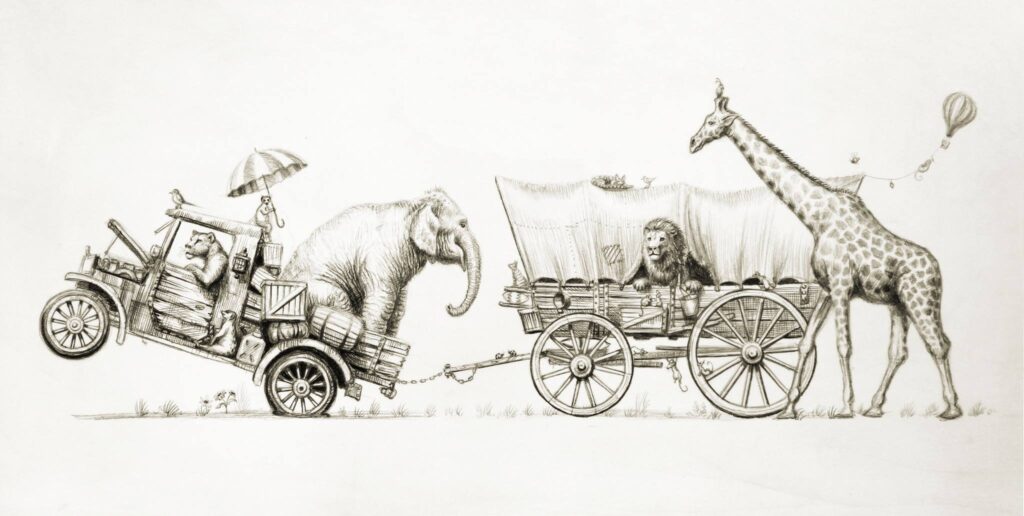
What is happening in your brain when you’re physically doing art?
My brain gets really quiet while I’m in the zone. My most fruitful times of inspiration and ideas is actually when I’m not doing art. This could be while I’m riding a bike, reading a book, etc.
Do you teach art in the Honors College?
Yes, it’s a ten-week drawing course that meets once a week. The project the students create is based on one of the books they read in the program. Some of the projects that the students have created in that class have inspired me to consider doing a large scale work on Homer.
Do you have a favorite book that you read from the Honors College reading list?
I really enjoyed Tocqueville’s Democracy in America, specifically his findings on American culture and life. He is just so spot on.
Honors College Alumna: Tamara Matthew
 Why did you study at HCU, what led you to the Honors College, and where has life taken you after graduation?
Why did you study at HCU, what led you to the Honors College, and where has life taken you after graduation?
My name is Tamara Matthew. I grew up in a Christian home and was raised in the Middle East, specifically on a small island kingdom called Bahrain, and I am ethnically of Indian descent. I left Bahrain when I was sixteen to come to Houston Baptist University (now HCU) as an international student, where I was involved in the Honors College. Why HCU? The simplest way I can respond to that is because of the peace and direction the Lord gave my parents in sending their youngest kid halfway around the world to study there. The scholarships didn’t hurt either, in all honesty! I didn’t know about the Honors College until they reached out to me, and I’m so glad they did. Post graduation from HCU, I spent some time working in a law firm in Bahrain. After over a year of long-distance, my current husband (who also attended HCU where we met) traveled to Bahrain to surprise-propose, and then I returned to Houston to settle here. In the last decade, I have worked in clinical research at UT Health, specifically in the trauma department, as well as at a start-up health and technology company in the health information sector. Additionally, I have been able to use my classical training to work at a music school where I teach piano and voice to several students weekly. In 2018, I decided to leverage over two decades of piano-playing and teaching to open a small business which I run to this day. I have had the privilege of teaching students both young and old enough to reach retirement!
You studied in the Honors College before Dr. Hartenburg came to HCU. How was the Honors College different? Did anything stay the same?
Yes, my time in the Honors College occurred when Dr. Robert Stacey was the dean. My honors cohort was one of the first ones to have gone through the curriculum and because of that, there was a sense that we were all figuring this out together, staff and students alike. It was raw and organic and unlike anything I had been a part of before. I will say that some fond memories include getting a front seat to Dr. Markos’s passionate lectures on Greek mythology while he brought the material to life. I also remember the walks to and from classes at the UAC since the Honors College was stationed in that building in those days.
What led you to pursue a degree in Christianity and how are you using it today?
I began college with the intention of pursuing medicine, via the pre-med program, which I did. Given that I thought I would be investing my time in the medical field for years after, I decided that I wanted to pursue a degree in something I would enjoy learning in college. I had fantasized about attending seminary, but since that was not the trajectory I was on at that time, I decided that I would pursue a degree in Christianity since that would not get in the way of my pre-med requirements. While I am not currently working in full-time ministry, I do have the opportunity to serve at the church where my husband and I attend (specifically, Sugar Creek Baptist Church). I am privileged to serve in the areas of outreach/missions, worship, as well as administration.
Since graduation, have you kept in touch with any of your professors, peers, or friends?
It just so happens that I was able to connect with my suitemates and a couple of honors alumni through a Zoom call late last year, namely, Jacque, Emily, Lorena, and Lisa. Other individuals that I see from time to time include Becka as well as Shannon and Andrew Adler, whom my husband and I were able to visit in Greece last year. I also currently attend a weekly book club with an Honors College alumna, Kristin, a class or two below mine, which I enjoy. Fun fact: I only just recently met Dr. Hartenburg in person at a coffee shop I frequent, and it was wonderful to meet and talk with him for a bit.
What would you say you are most thankful for generally in regards to your education at HCU and specifically in regards to your time in the Honors College?
I was very young when I came into the Honors College. Little did I know how much there would be to learn and grow in this next chapter of my life, not only academically but also emotionally and spiritually. There are two main reasons I am grateful for the role the Honors College has played in my life. Firstly, and I mentioned this earlier too, my bandwidth for learning and critical thinking grew exponentially in college. My baseline for this “type of thinking” was little to none prior to my move to the U.S. This is because, in the Middle East, we are taught the skills of regurgitation over questioning. How well you can reproduce material is the key to achieving merit in the education system, at least that is how it was for the school I grew up in. While there are pros and cons to this, those are part of a conversation better saved for another time. All this to say, the Honors College proved to be a focused introduction to the skill of analyzing and critically thinking about literary works and the idea of good versus evil, while molding us to ask questions. Better yet, I felt safe at HCU and the environment set by the Honors College to ask the questions I may have not have asked before. Secondly, and perhaps more importantly, it is the people I met in the Honors College and the special friendships I made during my time there that I cherish. The students I sat in classes with are the same ones that showed so much grace to a peer two years younger who was from halfway around the world. These are the very students who witnessed my transition from late teen to young adult, albeit they enjoyed teasing me about needing a legal guardian to sign permission slips for me until I turned eighteen. In fact, a couple of the women whose names I mentioned earlier are the very friends that graciously helped nurture me in my faith and understanding of God on a personal level.
What advice do you have for incoming freshmen?
To incoming freshmen or those even thinking about perhaps joining the Honors College, I would tell you not to underestimate the value of engaging material that is challenging and also to get ready for a unique experience ahead. I would also encourage you to know that this is a formative time, not one you need to be “ready” for up front. So allow your time in the Honors College, allow the people that you are learning alongside, and ultimately allow God to develop who you are becoming.
What are you looking forward to in the future?
Right now, I am focusing on my teaching as a ministry to love and instruct my students with grace and truth. It’s been really neat to see my passion for teaching grow. It can be difficult but it is also so fulfilling! I am also working on some compositions and songs that I would love, God-willing, to release as an EP in the future! My future work may include stepping into full-time ministry or going into seminary for further education or even returning to the medical field in some capacity. Whatever it is and wherever it is, I do pray that I will walk faithfully in the direction the Lord has for me and for our family. My husband and I are also on the lookout to buy a home later this year, so that’s exciting, but scary at the same time (these interest rates are no joke!). I am also working on my application to become a citizen of the United States. While the process is far less complex than that of applying for permanent residency, it still uncovers my lack of enthusiasm for tackling government paperwork. Once the process is complete, I will be a U.S. passport holder and be able to vote, which is exciting!
Want More News & Notes?
Subscribe to the Honors College Newsletter to receive updates in your inbox!
Honors College Alumni can update their contact information by completing the Honors College Alumni Survey.
